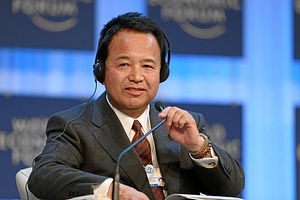Reporting by Shukan Bunshun (a weekly tabloid magazine) last week, which alleged Economic Revitalization Minister Akira Amari was involved in a cash-for-favors bribery scandal, led to Japan’s “TPP Chief” resigning from the Cabinet on Thursday. Amari explained, “Out of respect for my duty as a Cabinet member and to take moral responsibility as a politician, I have decided to resign from the ministerial post today.”
Amari was made responsible for Japan’s economic and fiscal policy under Prime Minister Shinzo Abe when the second Abe Cabinet was convened in 2012. He has been a key player pushing Abe’s economic agenda, including “Abenomics” domestically and the mammoth Trans-Pacific Partnership (TPP) trade deal internationally.
The Shukan Bunshun article alleged that Amari and his aides received illegal donations from a construction company in return for mediating negotiations between the company and Urban Renaissance Agency (UR), a semi-public housing developer fully funded by the central and local governments. The article accused Amari and his aides of accepting funds and entertainment from the construction company worth a total of 12 million yen ($100,000).
These allegations are based on testimony from Takeshi Isshiki, a worker for the Chiba-based construction company. In his tell-all account to Shukan Bunshun, he appears frustrated that the aides accepted his favors without really trying to facilitate a negotiation with UR. A UR official said a week ago that they were not influenced by Amari during the negotiations, but are still investigating the situation.
Amari has admitted to receiving 500,000 yen ($4,000) in cash in November 2013 and another 500,000 yen in cash in February 2014. However, according to Amari, these funds are aboveboard, as they were properly recorded as political donations (though there was a delay in reporting the November 2013 cash infusion until 2014). Amari insists that his actions were in compliance with the Political Funds Control Law. More importantly, he also denies that he was involved in negotiations between the construction company and UR.
However, one of his aides received 5 million yen ($42,000) from the construction company and spent 3 million of it personally (not properly reporting the sum as political funds). Two other aides were wined and dined by a member of the construction company. Amari’s resignation is to take political responsibility for his aide’s improper actions, but he has made clear he does not believe his own actions were improper.
This explanation about his aide’s behavior is based on an independent, third-party investigation – though new details could still emerge as the Democratic Party of Japan, the opposition, prepares to further investigate Isshiki’s claims.
There are multiple reasons for Amari to resign now.
First, as he explains it, “Japan is finally emerging from deflation. We need to pass legislation through parliament for steps to beat deflation and create a strong economy as soon as possible. Anything that hampers this must be eliminated, and I’m no exception. I, therefore, would like to resign as minister to take responsibility.” Valuable time during the Diet’s question-and-answer sessions could be squandered by the opposition hounding after Amari’s resignation.
Second, there is an important political dynamic, as the ruling Liberal Democratic Party (LDP) heads to the polls this summer for the triennial Upper House elections. If Amari’s scandal drags on, it could negatively affect the public’s image of Abe, for appointing and, worse, retaining a corrupt politician. That would be problematic at any time, but it is particularly troublesome this year. It was in the best interest of the party for Amari to resign as quickly as possible – once it became clear he could not sidestep the allegations – so that they will have sufficient time to rehabilitate their image.
However, Amari’s resignation is not a cure-all. There will, indeed, be less time being wasted by the opposition interrogating Amari, but the significant rupture his departure will cause to the legislative process could also throw off the government’s plan for finalizing important economic policies this spring. To give just one example, Amari is the only Cabinet minister who knows all the background information on the secretive TPP negotiations; his successor will have to deal with explaining the TPP to the public while learning about its many intricate details on the fly.
An economic policy of particular political significance is the expansion of agricultural subsidies to assist farmers. These policies are important to quiet farmers’ fears because the LDP is still dependent on electoral districts where the agricultural vote can be a determining factor. Amari clearly hopes his resignation will speed up the process by which subsidies will be approved (ideally, being finalized before the summer Upper House elections), but this gamble could backfire.
Yomiuri Shimbun also reports that “The foundation of Abenomics could be shaken,” because Amari was a critical mediator between Abe’s “reflationary” economic philosophy and the fiscal discipline of Taro Aso and the finance ministry. Amari was more sympathetic to the prime minister’s vision of spurring the Japanese economy back to life through pro-growth policies and increased spending (and adept at brokering compromise between Abe and the finance ministry).
Aware of such costs, and before all the details come to light from Amari’s side, Abe had expressed his hope that Amari would stay on.
Still, the signing of the TPP in New Zealand will go forward on February 4, though ratification of the 12-nation trade deal in the Japanese Diet is likely to be delayed. Nobuteru Ishihara, the LDP’s secretary-general, will succeed Amari and attend the TPP’s signing ceremony next week.

































